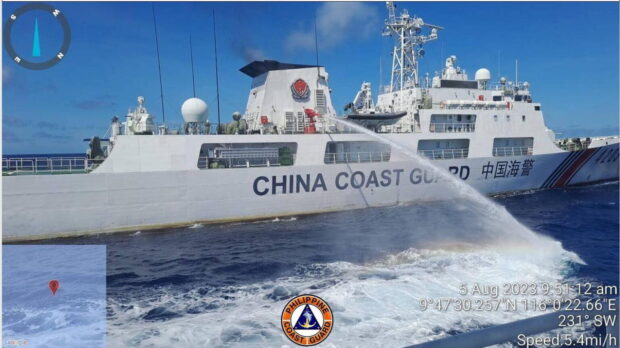85% of Filipinos distrust China, survey says

This file photo shows a China Coast Guard (CCG) ship preparing to strike a Philippine Coast Guard (PCG) vessel with a water cannon as it is on its way to Ayungin (Second Thomas) Shoal. (Photo from PCG FACEBOOK page)
MANILA, Philippines — Eighty-five percent of Filipinos nationwide distrust China while seventy four percent see the Asian superpower as the greatest threat to the Philippines, mainly due to its aggressive actions in the West Philippine Sea.
These were the findings of Octa Research’s Tugon ng Masa survey released on Monday, gauging the sentiments of 1,200 adult respondents from July 12 to 17.
Forty-one percent of respondents said they have “no trust at all,” while 44 percent said they have “not too much trust” with the country in question.
On the other hand, only 15 percent of respondents said they trust China, with 14 percent saying they have “a fair amount of trust” while one percent expressed “a great deal of trust.”
READ: Defending West Philippine Sea: The abyss separating Duterte, Marcos
Greatest threat
The majority, or 74 percent of Filipinos, think China is the greatest threat in the country, while at far second are Russia and North Korea at four percent each.
Two percent of respondents think the United States is the greatest threat to the Philippines.
Notably, 10 percent of respondents said “none” when asked which country poses the greatest threat to the Philippines.
“China is overwhelmingly perceived by Filipinos as the greatest threat to the country,” Octa said in a statement.
West Philippine Sea a big factor
For security expert Chester Cabalza, the findings of the survey mirror “the real condition of our bilateral and strategic relationship with them in recent decades.”
Cabalza noted that China’s “faltering perception of reality,” which framed the country as an aggressor in the West Philippine Sea, would not help ease the mistrust.
READ:‘Major loss of face’: China experts weigh in on ‘news blackout’ of Scarborough collision
“As long as China exercises dangerous manuevers from ramming, water cannon and laser attacks, and blocking supply lines to Filipino fishermen and navy marines, Filipinos will not trust China,” Cabalza, founding president of the Manila-based think tank International Development and Security Cooperation, told Inquirer in an interview on Monday.
Beijing made such actions to assert sovereignty in almost the entire South China Sea, a move effectively invalidated by a 2016 arbitral award, which ruled heavily in favor of the Philippines’ sovereign rights.
Meanwhile, Octa also said a great majority of adult Filipinos, or 76 percent, also expressed support for government actions in the West Philippine Sea.
Only three percent disagreed, while 19 percent remained undecided.
Not due to West PH Sea alone
Octa said, however, that while the West Philippine Sea dispute is a big factor on Filipinos’ negative perception of China, respondents also expressed economic and social factors.
“The roots of this perception are multifaceted,” it noted.
Sixty-six percent of respondents cited China’s aggressive acts in the West Philippine Sea.
However, 13 percent also cited the influx of smuggled products from the country; 9 percent cited the increase of crimes involving Chinese nationals; 8 percent were anxious over the influx of Chinese workers competing for local jobs; while 4 percent either “don’t know” or “can’t say” their reason.
“Taken together, the survey findings highlight a multi-dimensional distrust toward China,” Octa said.
“Filipinos not only view China as a direct threat to the country’s sovereignty and territorial integrity, but also express concerns about its economic activities and social impact on local industries and communities,” it added. /gsg
For comprehensive coverage, in-depth analysis, visit our special page for West Philippine Sea updates. Stay informed with articles, videos, and expert opinions.


















